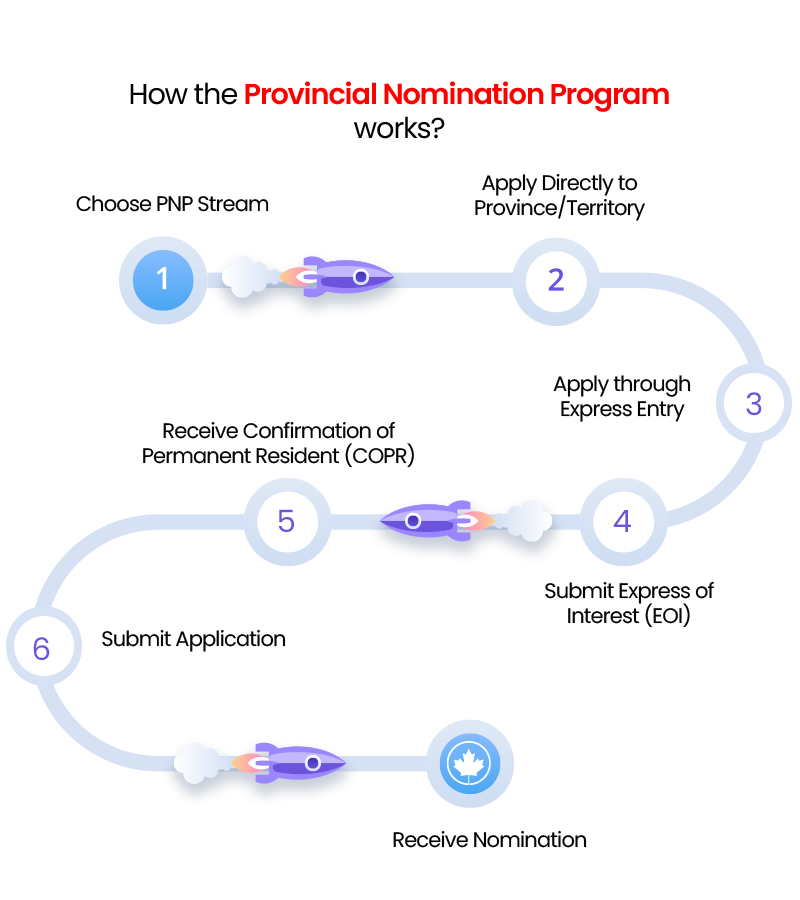
 GET FREE COUNSELLING
GET FREE COUNSELLING
How Provincial Nominee Program (PNP) Works?
Canada's Provincial Nominee Program (PNP) is a unique immigration pathway that allows individual provinces and territories to nominate skilled immigrants who will contribute to their local labor markets and economic development. This program is designed to address specific regional labor market needs and encourages the settlement of immigrants in areas outside of major urban centers.

- Understanding the Provincial Nominee Program
- The Origin and Purpose of the PNP
- The Structure of the PNP
- Eligibility Criteria for the PNP
- The Application Process for the PNP
- Steps to Apply for the PNP
- Processing Time and Costs
- Benefits of the Provincial Nominee Program
- Advantages for Immigrants
- Impact on Canadian Provinces
- Challenges and Criticisms of the PNP
- Addressing the Criticisms of the PNP
Understanding the Provincial Nominee Program
The Provincial Nominee Program (PNP) is not a new concept in Canada. It was introduced in the 1990s as a means to attract and retain skilled immigrants in smaller provinces and territories. The program has since evolved and expanded, playing a vital role in shaping the demographic and economic landscape of these regions.
The Origin and Purpose of the PNP
The Provincial Nominee Program was established as a response to the unique challenges faced by provinces and territories in attracting immigrants.
Unlike other federal immigration programs, the PNP allows individual provinces to have a more active role in selecting and attracting immigrants who have the skills and qualifications currently in demand within their jurisdictions.
Each province has its own set of selection criteria and immigration streams. This flexibility enables the provinces to tailor their programs to address their specific economic needs.
For example, in the province of Manitoba, the PNP focuses on attracting immigrants who have experience in occupations that are in high demand in the local labor market. This helps to address skill shortages and promote economic growth in the province.
Similarly, in the province of British Columbia, the PNP has specific streams for entrepreneurs and skilled workers. These streams are designed to attract individuals who can contribute to the province's economy by starting businesses or filling job vacancies in key industries.
The Structure of the PNP
The PNP is divided into two main categories: the Enhanced Provincial Nominee Program (PNP) and the Base Provincial Nominee Program.
The Enhanced PNP is linked to the federal Express Entry system, which manages the pool of candidates for three economic immigration categories:
the Federal Skilled Worker Program, the Federal Skilled Trades Program, and the Canadian Experience Class. Provinces that operate an Enhanced PNP have the authority to nominate candidates from the Express Entry pool and issue them an invitation to apply for permanent residence.
For example, Ontario operates an Enhanced PNP and has specific streams for skilled workers, international students, and entrepreneurs. The province actively selects candidates from the Express Entry pool who meet their criteria and have the potential to contribute to the province's economy.
The Base PNP, on the other hand, operates independently of Express Entry. Participating provinces nominate candidates who meet their specific criteria for permanent residency. These nominees receive a provincial nomination certificate, which allows them to apply for permanent residence through a separate federal application process.
For instance, the province of Saskatchewan has a Base PNP that includes streams for skilled workers, international graduates, and entrepreneurs. The province selects candidates who have the skills and experience needed in the local labor market and nominates them for permanent residency.
It is important to note that the PNP is subject to annual quotas set by the federal government. Each province has a limited number of nominations they can make each year, which adds an element of competition among candidates.
In conclusion, the Provincial Nominee Program is a crucial immigration pathway for Canada's smaller provinces and territories. It allows them to attract and retain skilled immigrants who can contribute to their economic growth and address specific labor market needs.
The program's flexibility and different streams cater to the unique requirements of each province, ensuring a tailored approach to immigration.
Eligibility Criteria for the PNP
Basic Requirements for Applicants
Applicants must have a valid job offer or employment opportunity from a provincial employer. This job offer must be in an occupation that aligns with the specific needs of the province. Furthermore, applicants must demonstrate the necessary skills, qualifications, and work experience to perform the job successfully.
Language proficiency is also essential, as applicants must have a minimum score in an approved language test to prove their ability to communicate effectively in English or French.
Specific Criteria for Different Provinces
Each province has its own unique set of criteria and eligibility requirements. For example, some provinces may prioritize applicants with experience in sectors critical to their economic growth, such as healthcare, technology, or agriculture. Others may have minimum net worth or investment requirements for business and entrepreneur streams.
It is crucial for applicants to research and understand the specific criteria of the province they wish to apply to. This ensures that they meet all the necessary requirements and have the highest chances of receiving a provincial nomination.
The Application Process for the PNP
Steps to Apply for the PNP
- Research and select the province or territory that aligns with your skills, experience, and future aspirations.
- Create an online profile and submit an Expression of Interest (EOI) to the desired province or territory. The EOI typically outlines your educational background, work experience, and language proficiency.
- If your profile matches the province's needs, you may receive an invitation to apply for a provincial nomination.
- Submit a complete application to the provincial government, including all required documents, such as proof of education, work experience, language proficiency, and any additional requirements specific to the province.
- After a thorough assessment, if your application is approved, you will receive a provincial nomination certificate.
- Complete the federal permanent residence application, including medical examinations and security checks.
- If your application for permanent residence is successful, you and your family can move to Canada and start a new chapter in your lives.
Processing Time and Costs
Each province also has its own fee structure. Applicants are required to pay application fees to both the provincial government and the federal government. These fees cover the administrative costs involved in processing the applications.
Benefits of the Provincial Nominee Program
Advantages for Immigrants
Furthermore, the PNP allows applicants to target their immigration efforts towards specific provinces or territories where their skills are in high demand. This increases opportunities for successful integration, employment, and overall prosperity in their chosen region.
Impact on Canadian Provinces
Additionally, the PNP helps address labor shortages in key sectors, ensuring the economic growth and development of these regions. By allowing provinces to actively select and attract skilled immigrants, the program contributes to a more balanced distribution of population and promotes regional prosperity.
Challenges and Criticisms of the PNP
Common Issues Faced by Applicants One common issue faced by applicants is the complexity and variation of the application processes across different provinces. Understanding and fulfilling the specific requirements of each province can be overwhelming for some individuals. .
Another challenge is the processing time, which can be a concern for applicants who are eager to start their lives in Canada. Lengthy processing times can cause delays in employment and settlement plans.
Addressing the Criticisms of the PNP
Furthermore, the federal government collaborates closely with the provinces to assess and address any concerns related to the program. Regular reviews and evaluations ensure that the PNP remains effective, inclusive, and responsive to the changing needs of both immigrants and the provinces.
In conclusion, Canada's Provincial Nominee Program (PNP) offers a unique opportunity for skilled immigrants to contribute to the economic growth and development of specific provinces and territories. By understanding the program's structure, eligibility criteria, and application process, individuals can navigate their way towards successful immigration and settlement in Canada.
The benefits of the PNP extend beyond the immigrants themselves, positively impacting the provinces and territories that welcome them. As the program evolves, it continues to address challenges and criticisms, aiming to provide a more seamless and inclusive immigration pathway for individuals who wish to call Canada their new home.
Curious about immigration? Read these FAQs
The PNP is an agreement held between the Canadian Government and local provinces, allowing 11 out of 13 Canada's provinces to nominate international candidates with job offers for PR. The set of requirements is unique or specific to individual provinces and regulated by their own immigration program.
The Provincial Nominee Program (PNP) is designed to enable provinces and territories to support the immigration of people who. have expressed an interest in settling in their province or territory.
Longer processing times: The PNP has longer processing times than Express Entry, which can delay the process to apply for Canada PR. Limited opportunities: The PNP may have limited opportunities for certain occupations or industries, which may make it more difficult for some candidates to qualify.
The ideal IELTS score required for Canada PR is 6 band which makes you eligible for PNPs.
Applicants who possess the Work Experience, Education and Skills can submit an application for the Provincial Nominee Program. Each territory and province has its own criteria for eligibility. Some PNP programs are allied with Express Entry while some are not.
Each PNP has its requirements and some nomination programs do not require a job offer to be eligible for provincial nomination.
Depend on Immigration Process.
Get quickest immigration & news updates
QUICK LINKS
FIND US
The Stark Visas - Best Immigration Consultants in India | Visa Services 1206-1208, 12th Floor, Ansal Tower, Nehru Place, New Delhi - 110019
Delhi Office
+91 8233-05-8233
info@starkvisas.com
1206-1208, 12th Floor, Ansal Tower, Nehru Place, New Delhi - 110019
Ahmedabad Office
+91 8233-05-8233
info@starkvisas.com
Office No. 307, B-Block 3rd Floor, Shreeya Atlanta Nr. Bhagban Party Plot Ahmedabad Gujarat 380054
